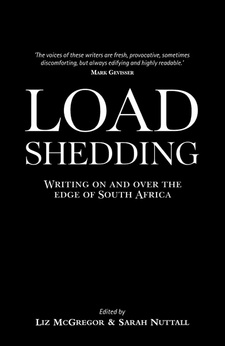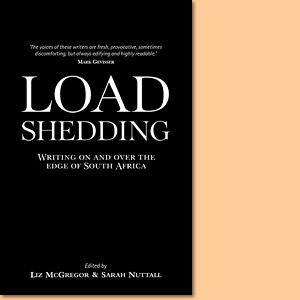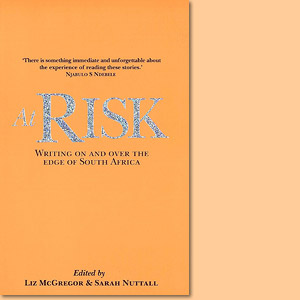Load-shedding. Writing on and over the edge of South Africa, by Sarah Nuttall and Liz McGregor
Load-shedding: Writing on and over the edge of South Africa is a collection of non-fiction stories from South Africa’s pre-eminent authors, journalists and commentators and edited by Sarah Nuttall and Liz McGregor.
Load shedding is a term well known to South Africans. It was as euphemism that it was first introduced to us by Eskom, the national electricity company. It defined load shedding as 'planned rolling blackouts based on a rotating schedule in periods where short supply threatens the integrity of the grid'. As one of the contributors writes, it is 'another name, less accusatory, less quick to apportion blame, for blackouts'. In the years 2007 and 2008, the term became all too familiar to South Africans as they were plunged regularly into darkness. In choosing Load Shedding as the title for this book, we wanted to signal not just the actual conditions of darkness that it refers to but the term's suggestive symbolic and psychic dimensions. 2008 was a hard year for South Africans. It seemed to be the culmination of a shift in the national psyche. It marked the end of the Mbeki era, with the president fired from office by the ANC, and the rise to prominence of Jacob Zuma, newly elected president of the ANC, a man with widespread support but whose populism, polygamy and lack of attention to issues of policy and political vision left many South Africans uncertain. The year saw less and less attention being paid by government to service delivery, and to high crime levels. It also marked the rise of xenophobic attacks relating to disputes over resources. These expressions of injury and resentment revealed the degree to which a new public conversation about citizenship was required. They also seemed to suggest a shift in this country's self-representation. Viscerally, the national mood seemed to be brute delight on the part of some, but the early symptoms of a depression for many others. The feeling was that we were living at the end of the dream years, at the tail end of our big Idea, and that we would need to find a different form of politics and new forms of personal resilience in order to move forward, both with the life of the country and with our own lives. Thinking back to the Mandela era and forwards to the start of the Obama presidency in the United States, Mark Gevisser reflects on our yearning for a new time in which South Africans are 'mobilised into active citizenship, not by the singing of an obsolete struggle anthem, but by the righteous articulacy of a profound and subtle thinker'. Perhaps paradoxically though, he continues, 'there may be something of a relief in being free, at last, of the politics of redemption'. Nevertheless, the burdens of being South African were newly felt and, consequently, there were loads to be shed, social and psychic baggage to acknowledge, to confront and to try to release. A period of uncertainty is almost always a reflective space, as people confront fears, distresses, a feeling of not-knowing - and so it is that we had no trouble finding excellent pieces for this book, a new archive of our times, following on from our first volume At Risk. Each of the first four essays suggest themes that are developed throughout the book. Liz McGregor opens the collection by writing about the deaths of her parents, exactly one year apart, her father murdered one night in his new home in Tulbagh. (...)
This is an extract from the book Load-shedding. Writing on and over the edge of South Africa, by Sarah Nuttall and Liz McGregor.
Book title: Load-shedding. Writing on and over the edge of South Africa
Editors: Sarah Nuttall; Liz McGregor
Publisher: Jonathan Ball
Cape Town, South Africa 2009
ISBN 9781868423231 / ISBN 978-1-86842-323-1
Softcover, 13x20 cm, 248 pages
Nuttall, Sarah und McGregor, Liz im Namibiana-Buchangebot
Load-shedding. Writing on and over the edge of South Africa
Load-shedding: Writing on and over the edge of South Africa is a collection of non-fiction stories from South Africa’s pre-eminent authors, journalists and commentators.
Springbok Factory. What it takes to be a Bok
Thousands dream of playing Rugby for South Africa. Springbok Factory tells what it takes to make it as a Bok.
Touch, Pause, Engage! Exploring the heart of South African Rugby
Touch, Pause, Engage! takes the reader on a journey to the heart of South African rugby.
At risk: Writing on and over the edge of South Africa
There is something immediate and unforgettable about the experience of reading these stories of At risk - writing on and over the edge of South Africa.





